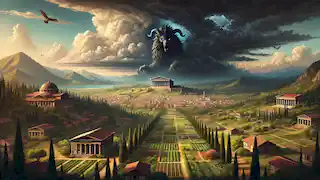In the ancient lands of Greece, where myth and reality often intertwined, there lay a kingdom beset by terror—a terror that none could escape or conquer. The kingdom of Lycia, ruled by the wise and just King Iobates, was a land of abundance, where the fields were ripe with golden grains, and the people lived in peace and prosperity. Yet, in the shadow of Mount Cragus, a great evil had been unleashed, an evil that none could have anticipated or prepared for—the Chimera.
The Chimera was no ordinary beast. It was a creature of nightmares, a monstrous amalgamation of the fiercest predators. Its head was that of a lion, fierce and proud, with a mane that blazed like the sun and teeth sharp enough to tear through steel. From its back sprang the head of a goat, its eyes wild and mad, its cries echoing through the valleys with a haunting, otherworldly bleat. And as if these two fearsome heads were not enough, its tail was that of a serpent, long and venomous, coiled and ready to strike at any who dared approach.
But the Chimera’s most fearsome weapon was not its claws or its teeth, but the fire that it breathed from its lion's mouth. With each exhalation, a torrent of flames would engulf the land, scorching everything in its path—crops, homes, and even the very earth itself. The once-fertile fields of Lycia were reduced to ash, and the people, who had lived in harmony with the land, were forced to cower in fear, unable to defend themselves against this unholy terror.
King Iobates was at his wit's end. His army, the pride of Lycia, had been decimated in their attempts to defeat the Chimera. His people were starving, their spirits broken, and the kingdom was on the brink of collapse. Desperation had taken hold of the once-great ruler, and he knew that without divine intervention or the aid of a hero, his kingdom would soon fall to ruin.
Far from the burning fields of Lycia, in the city of Tiryns, a young hero by the name of Bellerophon lived a life of privilege and honor. Born of noble blood, Bellerophon was a man of exceptional skill and bravery. His feats in battle were already the stuff of legend, and his heart burned with a desire to achieve greatness. But fate, as it often does, had a cruel twist in store for the young hero.
Bellerophon’s life took a dark turn when he was falsely accused of a crime he did not commit. Though innocent, he was condemned, and his name, once held in the highest esteem, was now a byword for treachery. Banished from Tiryns, Bellerophon became a wanderer, a hero with no cause, driven by a burning need to restore his honor and prove his innocence.
His wanderings brought him to the court of King Iobates, who, upon hearing of Bellerophon’s plight and his unmatched prowess in battle, saw an opportunity. The king offered Bellerophon a chance at redemption—a chance to clear his name by ridding Lycia of the Chimera. But there was more to Iobates’ offer than met the eye. The king knew that sending Bellerophon to face the Chimera was almost certainly a death sentence, and in his heart, he believed that the young hero would never return. Yet, Bellerophon, eager to regain his lost honor, accepted the challenge without hesitation.
Before embarking on his quest, Bellerophon sought the guidance of the gods. He journeyed to the Oracle of Delphi, whose prophecies were known to be both cryptic and accurate. The Oracle, in her trance-like state, revealed to Bellerophon that his only hope of defeating the Chimera lay with Pegasus, the winged horse. Pegasus, born of the blood of Medusa when she was slain by Perseus, was a creature of divine origin, as wild and untamable as the winds.
Determined to find Pegasus, Bellerophon made his way to Mount Helicon, where the winged horse was said to roam. For days he searched, but the elusive creature was nowhere to be found. It was only after Bellerophon prayed to Athena, the goddess of wisdom and warfare, that Pegasus appeared to him, descending from the skies like a star falling to earth.
Athena, taking pity on the young hero, gave him a golden bridle and instructed him on how to use it to tame Pegasus. With the bridle in hand, Bellerophon approached Pegasus with reverence and calm. The horse, sensing the purity of Bellerophon’s intent, allowed itself to be captured. With Pegasus now under his control, Bellerophon felt a surge of confidence. The Chimera, which had seemed an insurmountable foe, now appeared to be a challenge that he could overcome.
The journey to the Chimera’s lair was fraught with danger. Bellerophon flew over mountains and valleys, across scorched plains and desolate wastelands. As he neared the Chimera’s territory, the air grew thick with smoke, and the ground was littered with the charred remains of those who had fallen to the beast. The very earth seemed to tremble in anticipation of the coming battle.
When Bellerophon finally reached the lair, he found the Chimera waiting for him, as if the beast had known all along that this day would come. The creature stood at the entrance of a massive cave, its three heads moving in eerie synchronization as it watched the approaching hero. The lion’s head roared, sending a wave of fear through the hearts of all who heard it; the goat’s head screamed with a madness that could drive men to insanity; and the serpent’s tail hissed, its venomous fangs glinting in the firelight.
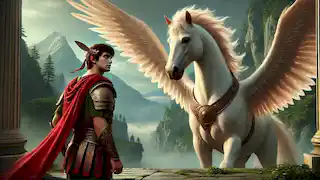
Bellerophon, undeterred, urged Pegasus forward. The winged horse soared into the sky, and with a battle cry, Bellerophon launched his first attack. He hurled a spear at the Chimera, aiming for its lion head, but the beast was quick and agile, dodging the strike with ease. The Chimera countered with a blast of fire, forcing Pegasus to swerve sharply to avoid being engulfed in flames.
The battle raged on, with Bellerophon striking from the air and the Chimera responding with its fiery breath and venomous strikes. Pegasus, with its incredible speed and agility, was able to keep Bellerophon out of harm’s way, but the Chimera’s hide was tough, and the hero’s weapons seemed to have little effect. Time and again, Bellerophon launched attacks, but each time the Chimera withstood them, its three heads moving with a terrifying unity of purpose.
As the battle wore on, Bellerophon began to realize that his current tactics would not be enough to defeat the beast. He needed to find a way to exploit the Chimera’s weaknesses, to turn its own strengths against it. He knew that the serpent’s tail was filled with deadly venom, and an idea began to form in his mind.
Waiting for the right moment, Bellerophon guided Pegasus into a steep dive, heading straight for the Chimera. The beast, seeing the hero approach, unleashed a torrent of fire, but Bellerophon and Pegasus moved with blinding speed, dodging the flames and closing in on the Chimera. With precision and skill, Bellerophon slashed at the serpent’s tail with his sword, causing the venom to spill from its fangs.
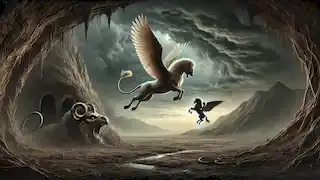
Before the Chimera could react, Bellerophon dipped the tip of his spear into the venom, coating it with the deadly substance. Then, with all his might, he hurled the spear towards the Chimera’s lion head. The spear struck true, piercing through the beast’s skull and delivering the venom deep into its brain.
The Chimera roared in agony, its three heads writhing in pain as the venom coursed through its body. The beast staggered, its strength failing as the poison took hold. Bellerophon, sensing that the end was near, delivered a final blow, striking the Chimera with his sword and bringing the creature crashing to the ground.
The kingdom of Lycia rejoiced at the news of the Chimera’s defeat. Bellerophon was hailed as a hero, his name forever etched in the annals of history. King Iobates, who had once doubted the young hero’s chances, was now filled with gratitude and offered Bellerophon a place of honor in his kingdom. But Bellerophon, ever the wanderer, declined. Though he had regained his honor, he knew that his journey was not yet complete. There were still many challenges to face, many battles to fight.
In the years that followed, the tale of Bellerophon and the Chimera became a legend, passed down from generation to generation. The Chimera, once a symbol of terror and destruction, now served as a reminder of the bravery and ingenuity of mankind. But despite the Chimera’s defeat, some believed that the beast’s spirit still lingered in the mountains of Lycia, waiting for the day when it would rise again.
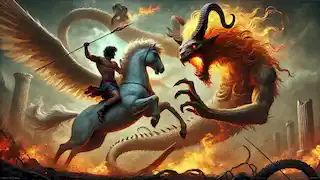
Bellerophon’s name became synonymous with heroism, but his story did not end with the Chimera. He continued his adventures, facing new trials and tribulations. Yet, for all his successes, Bellerophon was haunted by the knowledge that he had been brought low not by a foe, but by the gods themselves. For in his pride, Bellerophon sought to reach the heavens, to join the gods on Mount Olympus. But Zeus, the king of the gods, would not tolerate such hubris, and so he struck Bellerophon down. As Bellerophon soared high into the skies on the back of Pegasus, Zeus sent a gadfly to sting the winged horse. In agony, Pegasus bucked wildly, throwing Bellerophon from his back. The hero plummeted to the earth, falling from the heights of glory to the depths of despair.
Bellerophon survived the fall, but he was left broken in both body and spirit. He wandered the earth as a cripple, shunned by men and gods alike. His once-great strength faded, and he became a shadow of the hero he had once been. Yet, even in his misery, the tale of his triumph over the Chimera remained a beacon of hope and inspiration for all who heard it. Bellerophon’s story was a reminder that even the greatest of heroes could fall, but it was also a testament to the courage and determination that defined his legacy.
Years passed, and the kingdom of Lycia flourished once more. The land that had once been scorched by the Chimera’s flames became fertile again, and the people, who had lived in fear for so long, began to rebuild their lives. But the memory of the Chimera never truly faded. It remained in the minds of the people, a cautionary tale about the dangers that lurked beyond the boundaries of their world.
King Iobates, now an old man, often reflected on the events that had transpired in his kingdom. He had once feared that Lycia would be lost to the Chimera’s wrath, but Bellerophon had saved them all. The king knew that without the hero’s bravery, his kingdom would have fallen to ruin. Yet, he also recognized the cost of Bellerophon’s victory. The young hero had paid a heavy price for his glory, and Iobates could not help but wonder if the gods had been too harsh in their judgment.
The Chimera, though defeated, left a lasting impact on the land. It was said that in the dark corners of the world, there were still those who worshiped the beast, believing that it would one day return. Cults dedicated to the Chimera’s resurrection sprang up in secret, their followers praying for the creature’s revival so that it could bring destruction upon the world once more.
But such prophecies were met with skepticism by most. After all, the Chimera had been vanquished by Bellerophon, and its remains were buried deep beneath the earth. The people of Lycia chose to live in hope rather than fear, believing that their kingdom was now protected from the darkness that had once threatened to consume them.
Bellerophon’s tale continued to inspire generations of heroes. In the great city of Athens, in the courts of Sparta, and in the far reaches of the Greek world, storytellers recounted the legend of the young man who had tamed Pegasus and slain the Chimera. His deeds were immortalized in song and poetry, his name invoked by those who sought to achieve greatness themselves.
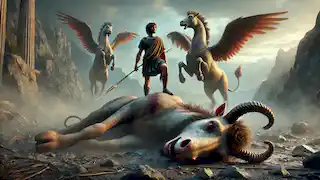
But for all the glory that Bellerophon had earned, there were lessons to be learned from his downfall. His pride had led him to believe that he could stand among the gods, but in the end, he was reminded of the limits of mortal ambition. The story of Bellerophon became a cautionary tale, a reminder that even the mightiest of heroes must remain humble in the face of the divine.
The gods of Olympus, watching from their lofty thrones, took no joy in Bellerophon’s suffering. Zeus himself regretted the necessity of his actions, for Bellerophon had been one of the greatest mortals to ever walk the earth. But the laws of the cosmos were unyielding, and no mortal could ascend to the heights of Olympus without paying a price. Even so, the gods knew that Bellerophon’s name would live on, long after they themselves had faded from the minds of men.
And so, the tale of the Chimera came to a close, but its legacy endured. In the mountains of Lycia, where the beast had once roamed, there were still whispers of its return. Some said that on moonless nights, the ground would rumble and the air would grow hot, as if the Chimera’s spirit still lingered, waiting for the moment when it could rise again.
Yet, despite these fears, the people of Lycia chose to remember the hero who had saved them. Statues of Bellerophon and Pegasus were erected throughout the kingdom, standing as symbols of hope and resilience. The story of the Chimera became a source of inspiration for those who faced their own trials, a reminder that even the most fearsome of foes could be defeated by courage and ingenuity.
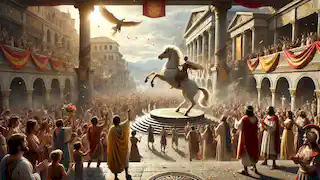
The world moved on, but the tale of Bellerophon and the Chimera was never forgotten. It became part of the rich tapestry of Greek mythology, woven into the stories of gods and monsters, heroes and legends. And as long as there were those who believed in the power of courage and determination, the spirit of Bellerophon would live on, a shining example of what it meant to be a hero in a world filled with both light and darkness.
